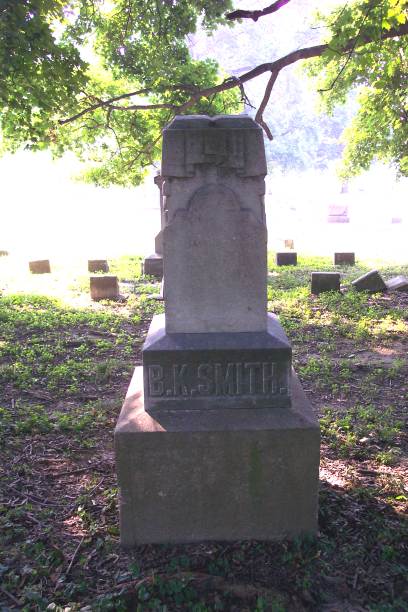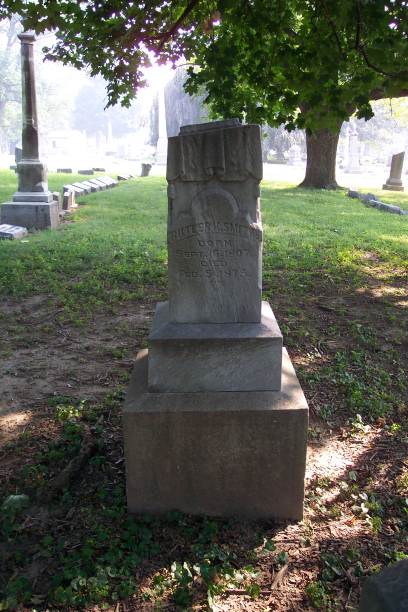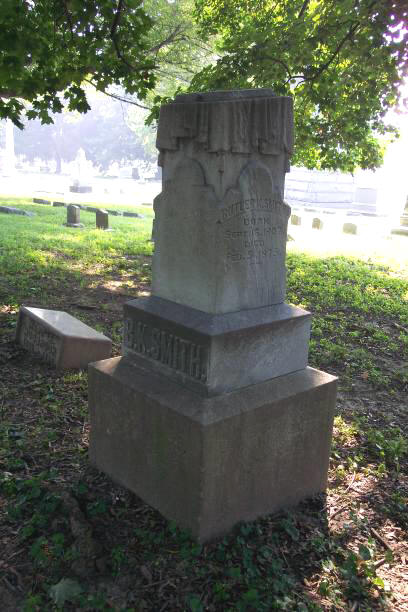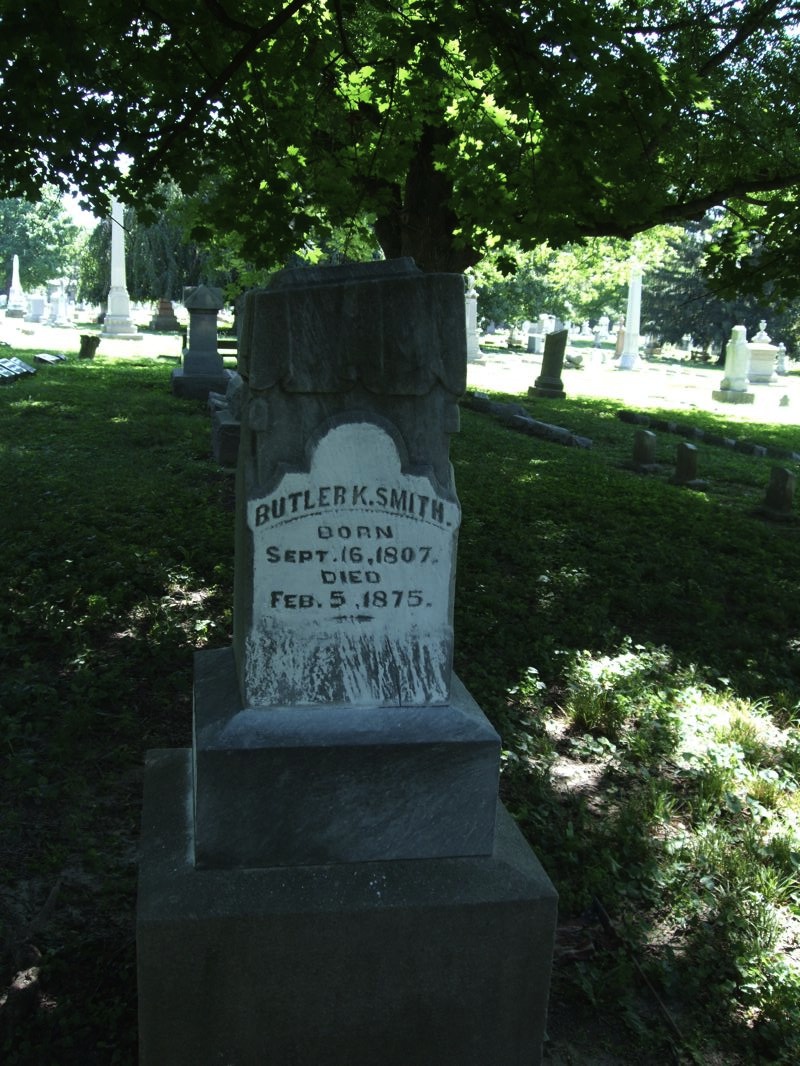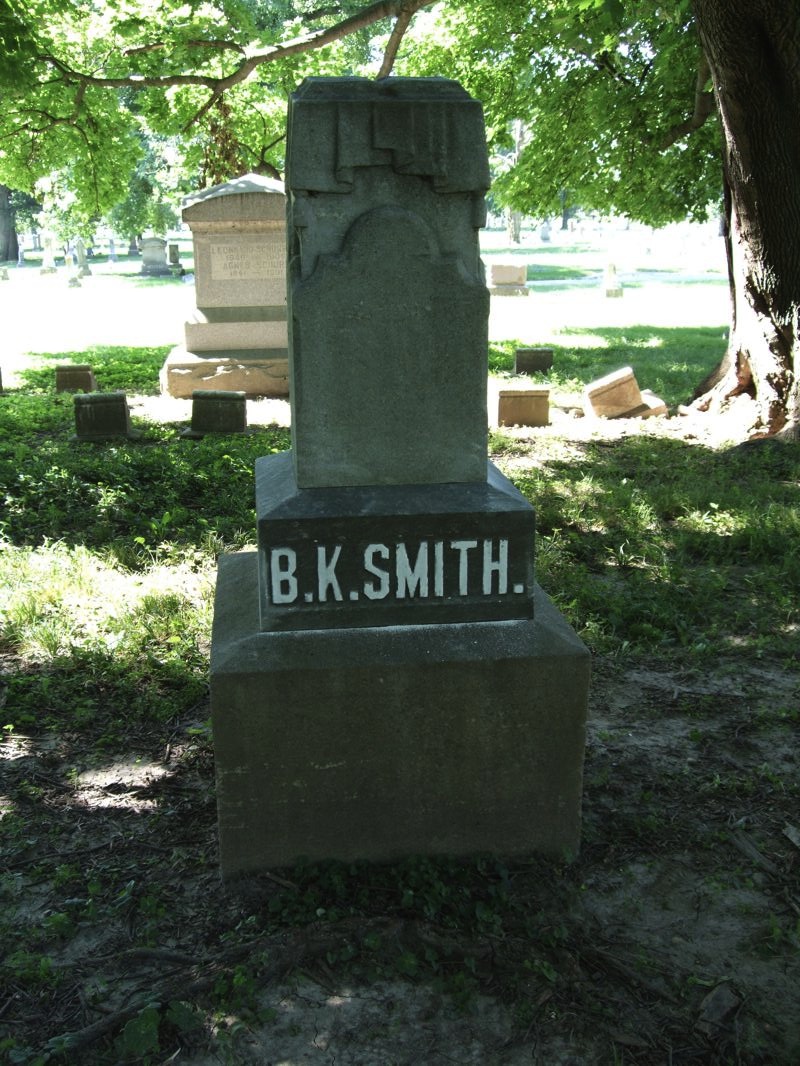Butler Kennedy Smith
1807-1875
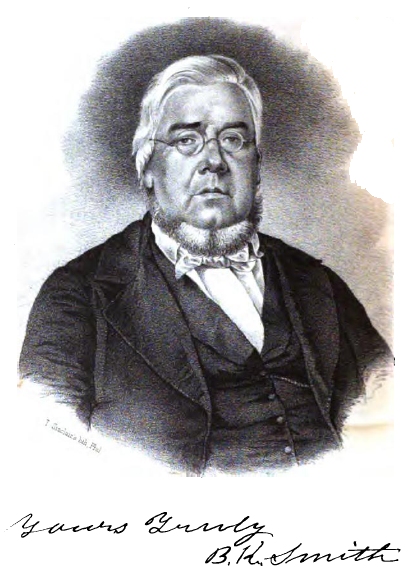
![]()
Biographical Sketch On The Life Of Butler K. Smith
Elder Butler Kennedy Smith was born in Spartansburgh District, South Carolina, on the sixteenth day of September, 1807. When he was an infant his father disposed of his possessions in South Carolina, intending to emigrate to Indiana Territory; but, changing his purpose, he settled in the adjoining District of Union, where Butler K. spent the happy days of his childhood.
In the Spring of 1817 his father carried out his long cherished design of removing to the Northwest. In April of that year he reached Indiana, and soon after entered land on the head waters of West river, in Wayne county. Here in the wild woods, theirs being the extreme frontier house for a long while, Butler K. passed the remaining years of his minority.
In a country like that there could be no such thing as a school; consequently he never suffered from that "weariness of the flesh" which is produced by "much study." He had been taught to read before leaving his native State; and with this ability he gleaned what information he could from the few books owned by his father, and from the newspapers, which at long intervals found their way into the neighborhood. In the course of a few years, however, a respectable school was established, in which he acquired a pretty thorough knowledge of arithmetic, and was shown a little way into the symbolic mysteries of algebra. This, with the general knowledge since gathered by the wayside, is the sum total of his education.
The circumstances surrounding him were equally unfavorable to moral and religious culture. It was only occasionally that a Methodist itinerant left an appointment in the neighborhood; and the nearest Baptist church, of which both his parents were members, was ten or twelve miles distant, entirely beyond his range. At a distance of three or four miles there was a Society of Friends, whose meetings he frequently attended, but without once hearing a discourse exceeding five minutes in length. His religious training devolved, therefore, on his parents, by whom he was thoroughly indoctrinated according to the creed of the Calvinistic Baptists.
In the course of a few years a couple of Baptist missionaries established a station at his father's house; and from that time he heard one or more of the "five points" expounded every month. Under this preaching several persons professed to have "obtained a hope," and among the number was Carey Smith, the eldest brother of Butler K. These fresh recruits, together with a few old soldiers of the cross, nine in all, were organized as a "Baptist Church of Jesus Christ," which was christened "Bethlehem." William Smith, the father of B. K., was made deacon, and Carey was ordained as pastor, with license "to preach and exhort wherever God in his providence should cast his lot." Thus a church was brought near to Elder Smith, but from the gospel he was as far removed as ever. He strove to enter in at the straight gate, but all his efforts were ineffectual. By constant exertion he worked himself into the belief that he had obtained what his parents and brother denominated a "trembling hope;" but his "experience" being unsatisfactory, his "hope" was evanescent. He finally reached the following conclusions, which are stated in his own language:
1. That I was one of the non-elect. Such be case, the present life was all I could promise myself any enjoyment in; consequently the less I thought about a future state the better.
2. If I was of the elect the Lord's time for effectually calling me had not yet come; consequently any effort, on my part, to forestall the divine arrangement would be useless, if not sinful.
3. That the whole matter of religion was but a farce, gotten up by priest-craft to gull the superstitious and weak-minded.
Such being his convictions, the Bible was laid aside, and Burns' Poems became his favorite pocket companion. In "Holy Willie's Prayer," "Kirk's Alarm," "Ordination," and "Holy Fair," he specially delighted, because of the clear light in which they exposed the absurdity of the Calvinistic theory. A decent self-respect and the early counsel of his parents kept him from descending to gross immoralities; but for a long while, the fear of God was not before his eyes.
In the Fall of 1823 or '24 his brother Carey, mounted on a sorry nag and an old weather-beaten saddle, set out on a preaching tour through Kentucky and other Southern States. In Kentucky he fell in with "The Christian Baptist," with which he was so well pleased that he ordered two copies of the work, as far as published, to be sent to Indiana, one to his own address, the other to that of his father. Thus his apparently unpromising mission was the means of introducing the primitive gospel and the ancient order into Wayne and other counties of Eastern Indiana.
He lived to see many churches grow up under the labors of himself and others. Finally he went on a mission to the South, under the special patronage of Elder A. Campbell, and fell a victim to the Southern climate soon after reaching his field of labor. He died at Fayette, Miss., on the 27th of January, 1841, in the forty-first year of his age, and about the eighteenth of his ministry. He was among the very first of the pioneer preachers of Indiana, but his career was of short duration, and confined to the day of small things.
By the reading of the "Christian Baptist," Butler K.'s objections to Christianity were removed one by one. Gradually the fog of false teaching and consequent skepticism rolled away, and he saw once more the water of life, with full assurance that he might approach and partake freely. But on the principle embodied in the old adage, "A burnt child dreads the fire," he approached very slowly and cautiously. It was not until the Spring of 1832 that he obeyed the gospel, being baptized some six miles southwest of Indianapolis, by an aged and semi-reformed Baptist preacher by the name of William Irvine, alias "Uncle Billy."
Prior to this event, however, some changes worthy of note had taken place. For the purpose of establishing themselves in the business of blacksmithing, which trade was a kind of heirloom in their family, he and his brother Carey had removed to Indianapolis, at which place they arrived on the 1st of February, 1829; and, on the 17th of November, 1831, he had married Miss Sarah Bristow, the third daughter of Peyton Bristow, Esq., of Marion county.
At the time of their removal to Indianapolis, there was at that place a Baptist church, which had reported itself to the "Christian Baptist" as reformed; but it was still so far from the ancient order that Carey Smith refused to unite with it, and attached himself to a congregation in the country designated by the significant name of Liberty church. At the period of Butler K.'s immersion, the said Liberty church was arraigned before the Indianapolis Association on the charge of heresy, and the so-called Reformed church was taking an active part in the prosecution. Therefore the little church which was organized in the "Bottom," (or six miles from town on the Bluff road,) and of which Elder Smith and his wife were original members, did not report itself to the Association, but assumed an independent form of government, adopting the New Testament as its constitution or creed. They also recognized the principle of weekly communion; and, as far as they understood it, conformed in all things to the order observed by the primitive churches. In this faithful little congregation he retained his membership until the 12th day of June, 1833, on which day was organized "The Church of Jesus Christ at Indianapolis, Indiana." The organization was effected at the house of a brother Benjamin Roberts, Peter H. Roberts and John H. Sanders being chosen as the first overseers.
When the disciples met together on the next "first day of the week to break bread," not an officer of the church was present. But there were a faithful few who were not ashamed of the gospel; and there were quite a number of spectators, anxious to see how those "Campbellites" would conduct a meeting without a preacher.
For a while it was conducted in the most approved Quaker style. Not one of the members present had ever spoken in public, and every one's "tongue seemed to cleave to the roof of his mouth." When the suspense became intolerable, Elder Smith went forward, took up a collection of Baptist hymns, there was then no Christian hymn-book, and began to search for a suitable song. The prayer that he was soon to make in public was pressing with mountain weight upon his mind; and, fearing that he might make a failure, he selected the familiar hymn beginning with a definition of prayer especially favorable to him on that occasion, viz.:
Prayer is the soul's sincere desire,
Uttered or unexpressed."
This hymn he read and lined out as it was sung, thinking by that means to throw off his embarrassment before the arrival of the critical moment. But the last stanza being ended, his heart failed him, and he sat down, overwhelmed by a sense of dizziness and blindness. One or two other brethren attempted to lead in the exercises, but each and all failed precisely where Elder Smith had failed. Thus the first meeting adjourned, the loaf being unbroken, not a single prayer having been offered.
This mortifying failure taught the disciples that elders and deacons alone were not to be depended upon; but that it was the duty, as well as the privilege, of all, "to offer up spiritual sacrifices acceptable to God by Jesus Christ.'' Realizing this, and seeing clearly that the church would go to ruin if such abortive meetings were permitted to recur, Elder Smith added to his faith courage, and at once stepped forward into the front rank of that little faltering band.
To obviate the difficulty growing out of the absence of the officers, two more elders and as many additional deacons were appointed. Of the latter, Elder Smith was made one; though he still retained the office of sexton, sweeping, warming, an dilluminating the old school-house, which was the pro tempore "Christian chapel." Ever faithful and punctual in his attendance, he gave the sacred emblems to the disciples; and in the absence of all four of the elders, he officiated at the table.
In a short time he became one of the overseers of the congregation, which position he occupied until Elder L. H Jameson was installed as pastor of the congregation, in October, 1842. At that time Elder Jameson was ordained as an evangelist, Ovid Butler as bishop, and some three other brethren as deacons. His last official act, as an elder of that congregation, was to preside over the Presbytery which officiated on that occasion.
Shortly afterwards he was himself ordained as "an evangelist at large;" and thus released from all personal responsibility as to the management, government, and edification of the Indianapolis church.
In his watchful care over that congregation, and his zealous efforts to extend its borders, he had greatly neglected his own business, and had consequently lost very much of the liberal patronage he once received. Moreover, his location at that central point, and his position as elder of the church at the capital, enabled him to form but too many acquaintances, and constrained him to receive but too many calls from his brethren in different parts of the State. His house was for many years a Disciples' Inn, and his stable was usually well filled with horses not his own.
Owing to these combined causes he became greatly involved in debt; and finally had to dispose of his town property (that would be a fortune to him now) at a great sacrifice, and remove to a farm several miles in the country. There he worked hard to retrieve his former losses; and in the course of a few years, frowning poverty was succeeded by smiling plenty. During these years of severe manual toil he did not wholly forsake the word of life; but on almost every Sunday he rode away from one to ten miles, preached one or two discourses, and returned the same day.
Early in the year 1849 he was solicited by the co-operation meeting to evangelize in the county of Johnson. This call he accepted; and, in April, entered into his new field at a salary of three hundred dollars per annum. The principal churches composing the "co-operation" were at Franklin, Mount Auburn, Edinburg, and Williamsburgh. For these, and in destitute places, he labored with such success, that he was employed to evangelize another year in connection with Elder Ara Hollingsworth.
Anxious that he should devote his whole time and attention to the work of the ministry, his brethren, at the commencement of the second year, urged him to lease out his farm for a term of years, at the same time making him verbal and indefinite promises of a liberal support. Yielding to their requests, and abandoning the farm, his only sure base of operations, his supplies were soon cut off; and by the close of the year he found himself reduced almost to absolute want. But this return of financial embarrassments only exemplified still further the apostle's declaration that "all things work together for good to them that love God." By the irresistible force of circumstances he was compelled to visit other and distant points, where he hoped to find more liberality, and at least equal opportunities of doing good. In this way he made himself known to many brethren who, perhaps, would never have heard of him had he continued a successful tiller of the soil. Thus his area of usefulness was widely extended; and he was forced to fulfill the hitherto unfulfilled conditions of his commission as "evangelist at large."
Though his labors were arduous, he fared sumptuously every day, and so far as himself was concerned he could have enjoyed this itinerant service very well. But every dainty morsel was robbed of its relish by the recollection that his wife and children were subsisting on the cheapest and coarsest fare; and as he sat by the fireside of the thrifty farmer, father, mother, sisters, brothers, all present, the happy circle unbroken, his mind was filled with sad thoughts of a very different scene beneath his own distant roof. But remembering the words, "He that loveth son or daughter more than me is not worthy of me," he sustained the cross, and continued to point the people to Him whom, for their sakes, the cross sustained.
Having spent some two years in these desultory labors, he was invited to take the pastoral charge of the congregation at Harrison, in Dearborn county. This call he accepted, and removed to Harrison in the Spring of 1853. The congregation at that place gave him three hundred dollars for half his time, and two churches in Kentucky gave him the same amount for the remainder. Thus he received a salary of six hundred per annum, which was more than sufficient to supply the temporal wants of his family. At this point he spent two of the happiest years of his life, the success of the gospel being not the least cause of his rejoicing.
In May, 1855, he returned to his farm near Indianapolis, where he has continued to reside. From that time to the present he has preached regularly for some two or three congregations, and has gone hither and thither throughout Central Indiana, preaching the gospel of the kingdom, establishing new churches, edifying old ones, healing dissensions, and provoking to love and good works.
In addition to his preaching he has exerted a considerable influence, and become somewhat distinguished as a writer. He wields a vigorous pen, which, for the last fifteen or twenty years, has been industriously employed in contributing to the various Christian periodicals.
He is now, and has been from the beginning, a punctual and working member of the Board of Directors of the N. W. C. University. He also acts a prominent part in the management of County, District, and State Meetings; and is well known as a true friend of education, an active and liberal supporter of missions, both home and foreign, and of every institution, human or divine, which ends to the physical improvement, mental illumination, or spiritual elevation of his race.
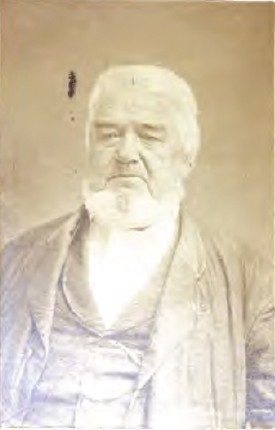 Of the personal appearance of Elder B. K.
Smith, no written description is necessary. By one glance at the portrait
accompanying this sketch, the inquirer will obtain a better idea of that than it
is in the power of words to convey. Like the ancient Eli, he is "an old man and
heavy." He has too much sound sense to attempt to adorn such a person as
his with fine clothes; therefore he dresses in very plain style, his main object
being to give the respiratory organs full play, and to guard against the
suffocating effects of heat.
Of the personal appearance of Elder B. K.
Smith, no written description is necessary. By one glance at the portrait
accompanying this sketch, the inquirer will obtain a better idea of that than it
is in the power of words to convey. Like the ancient Eli, he is "an old man and
heavy." He has too much sound sense to attempt to adorn such a person as
his with fine clothes; therefore he dresses in very plain style, his main object
being to give the respiratory organs full play, and to guard against the
suffocating effects of heat.
His mental machinery is not of the most ponderous kind; but his inexhaustible supply of physical force runs it at a furious rate. Impelled by this bodily vigor, his mind easily surmounts obstacles which would be insuperable to a superior intellect inhabiting a frailer tenement. But the Lord has given him more than one talent, though he may not have given him five. Such are his abilities, natural and acquired, that when the Master comes to reckon with his servants, he may truly say, "Lord, thou deliveredst unto me two talents; behold, I have gained two other talents besides them." He is a bold, original thinker, who attempts the solution of the most intricate problems in theology, and who usually throws some additional light on subjects the most difficult to elucidate.
He is an edifying, stirring speaker, fluent, impressive, and oft-times affecting even to tears. His voice is deep and powerful, but under perfect control; his gestures are natural, and therefore appropriate; his countenance glows with animation; and his whole manner is so earnest as to force upon his hearers the conviction that "from the abundance of the heart the mouth speaketh." He is fond of doctrinal subjects; but he faithfully reminds his brethren of the practical precepts of the gospel. He opposes at all points those who resist the truth; yet in so doing he does not assume the authoritative air of the Saviour when he said, "O generation of vipers," but rather that sympathetic mood in which he exclaimed, "O Jerusalem, Jerusalem, thou that killest the prophets, and stonest them that are sent unto thee."
In all things he endeavors to please him who has called him to be a soldier. Therefore he does not suffer himself to become much entangled in the affairs of this life; but the affairs themselves, especially his own, are apt to become greatly entangled. He is not remarkable for the possession of great tact, or superior business qualities; and his bump of order would hardly be found by the clumsy fingers of some pseudo-phrenologists.
He is a man of warm and generous emotions, kind, forgiving, tender-hearted, ardently attached to his family and friends. Above all other objects he prizes "the kingdom of God and his righteousness".
"The church our blest Redeemer saved
With his own precious blood."
For it he has toiled and suffered, denying himself the pleasures, the riches, the honors, all the "vain pomp and glory of this world." In its service he is fully resolved to spend the remainder of his days, with a firm reliance on the promise, "They that be wise shall shine as the brightness of the firmament, and they that turn many to righteousness as the stars forever and ever."
-Biographical Sketches of Pioneer Preachers Of Indiana, Madison Evans, Page 363-373.
![]()

![]()
Directions To The Grave Of B.K. Smith
Butler K. Smith is buried in the Crown Hill Cemetery, Indianapolis, Indiana. Traveling On I-65 North Out Of Downtown Indianapolis, Indiana Take The Dr. Martin Luther King Street Exit - Exit 117. (Note: If you cross White River, You Have Gone Too Far) Go North On Dr. Martin Luther King Street. Turn Right On West 32nd Street. Cemetery Will Be On Your Left. Go Until The Road Dead Ends Into Boulevard And Turn Left. There Will Be An Entrance To The Cemetery As You Cross The 34th Street Intersection. Turn Left Into The Cemetery. Be Sure To Click On The Map for specific location in the cemetery.
GPS Coordinates
39°49'04.9"N 86°10'34.3"W
or D.d. 39.818023, -86.176185
Grave Facing North
Accuracy to 17ft.
Section 21, Lot 32
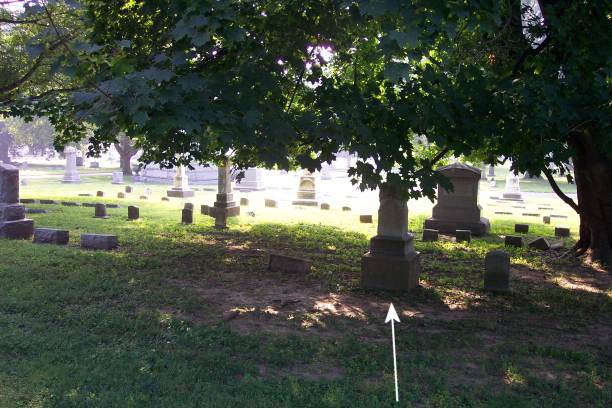
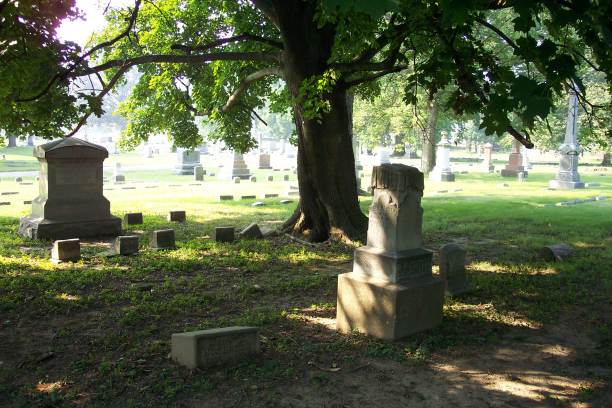
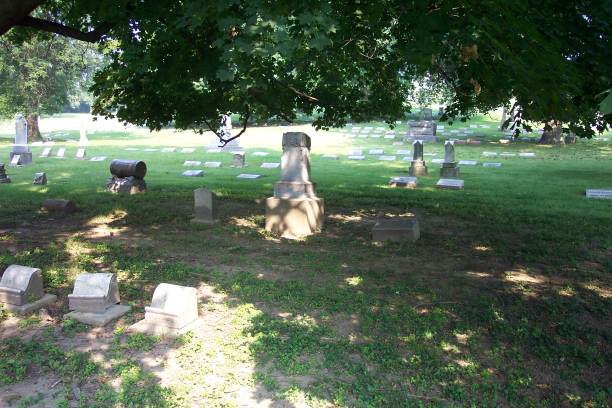
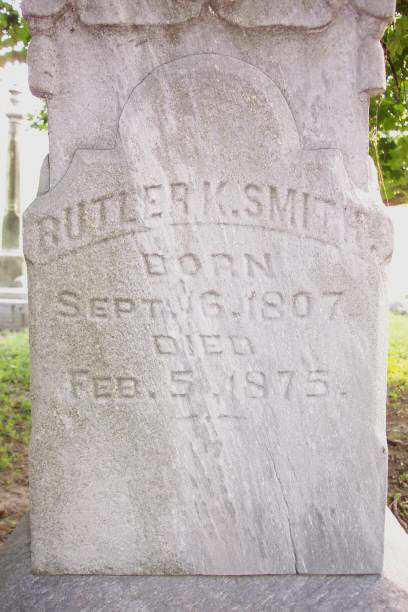
Butler K. Smith.
BORN
Sept. 6, 1807
DIED
Feb. 5,1875.
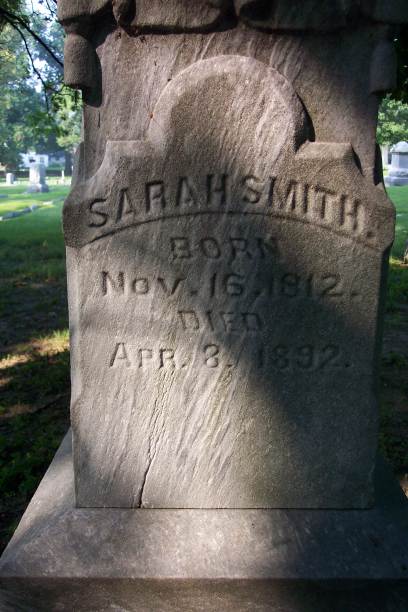
Sarah Smith.
BORN
Nov. 16, 1812
DIED
Apr. 3,1892.
Below are some shots taken in June, 2009
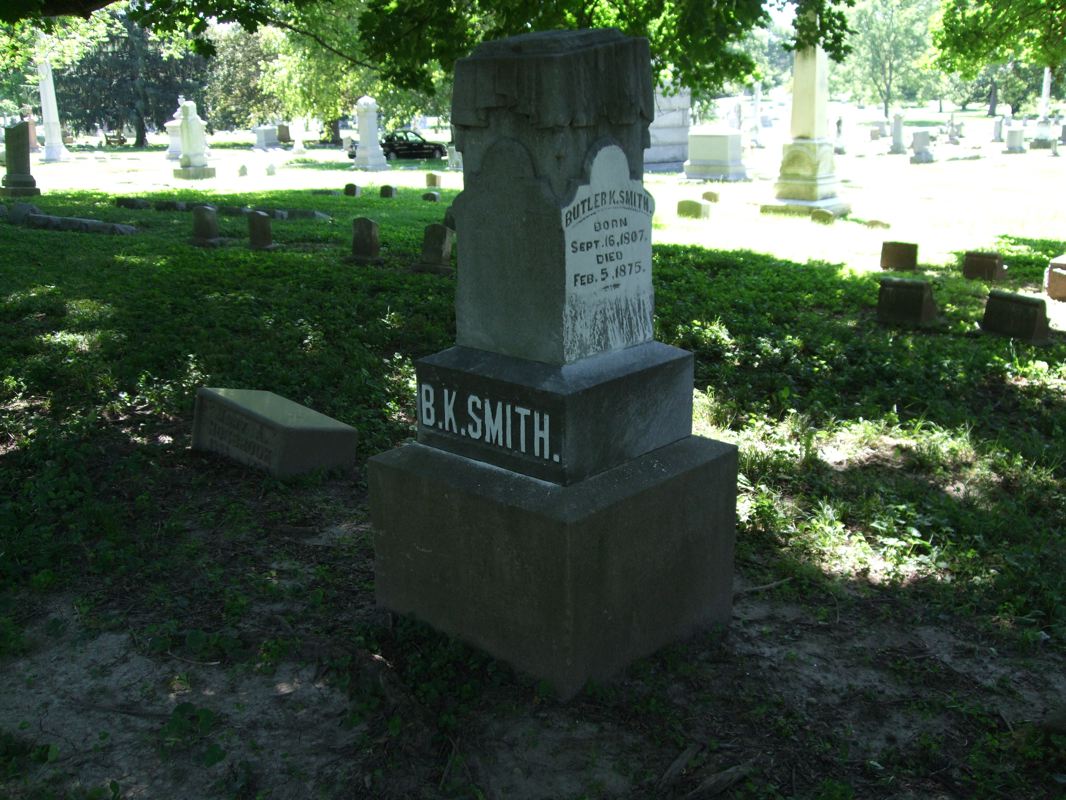
![]()
